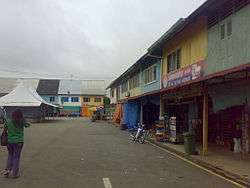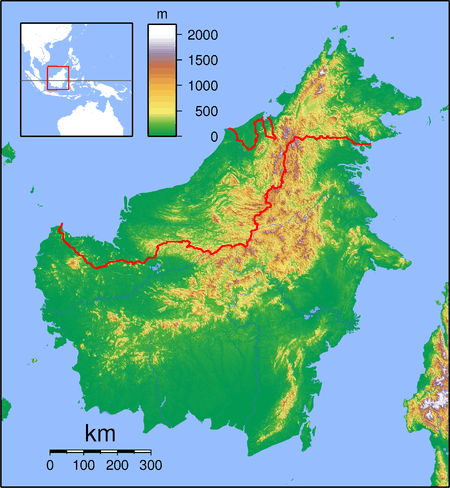Spaoh
| Spaoh | |
|---|---|
 | |
 Spaoh | |
| Coordinates: 1°30′0″N 111°30′0″E / 1.50000°N 111.50000°ECoordinates: 1°30′0″N 111°30′0″E / 1.50000°N 111.50000°E | |
| Country |
|
| State |
|
| Population | |
| • Total | 17,000 |
Spaoh is a small town and a sub-district in the Betong Division in the state of Sarawak, Malaysia, formerly known as Saribas District.
Geographically (not administratively), Spaoh is divided into areas such as Ili Pasar Spaoh (Spaoh downriver), Bungin, Paku Ili (Brutan), Ulu Paku and Ulu Anyut.
History
Spaoh town was established by the Hakka Chinese in 1946. Back then, there were four blocks of shops, with eight shops in each block. These four blocks of shops encircled Spaoh Wharf.[1] Presently, the Spaoh town still consists of these four block of shops.
Economy
The main economical activity in Spaoh is farming. Most of the farmers here plant paddy or pepper and some do rubber-tapping.
The town throve in the 1960s following the boom in rubber prices.[1] Rubber products were shipped out from Spaoh to Kuching via the small settlement of Pusa. By the 1970s, the town's economy started to decline due to competition from other towns and settlements.[1]
Population
The total population of Spaoh sub-district is around 17,000: Ibans (5,950), Malay (Orang Laut) (11,050) and Chinese (850). Although Ibans are only the second-largest group in Spaoh, most people in Spaoh interact in the Iban dialect which is understood by both Chinese and Malays. English and Malay are widely spoken too.
Attractions
The main attractions of this district include the Bukit Saban resort & the production of the salted pufferfish known as Ikan Masin Buntal, which is a local delicacy, in the Malay villages around Spaoh. The pufferfish, known to locals as buntal, is also the mascot of Spaoh.
References
- 1 2 3 "Spaoh, Debak: Tales of 2 less-travelled towns". The Borneo Post. Retrieved 23 June 2016.